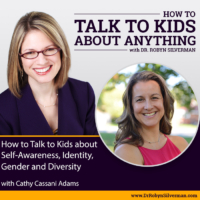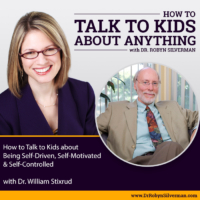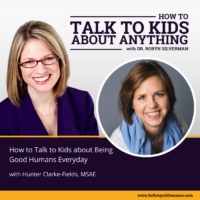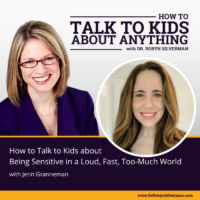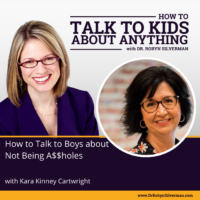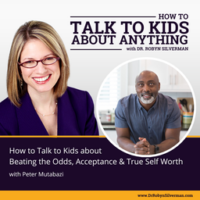Podcast: Play in new window | Download
Subscribe: Apple Podcasts | RSS | More
How to Talk to Kids about Self Esteem, Gender Identity & Being Yourself
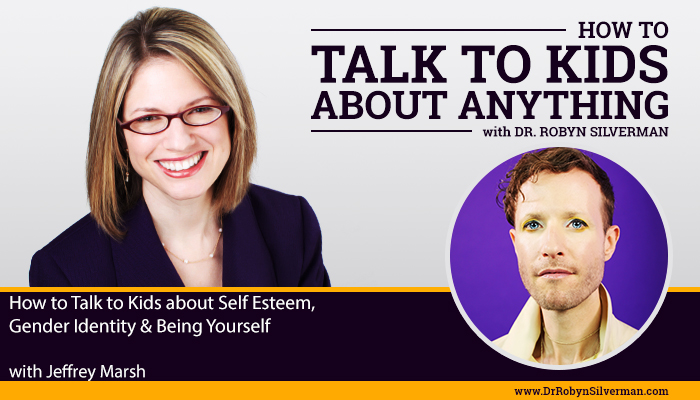
This podcast will focus on the collision between self-esteem and gender identity- especially for children who don’t have the support they need to truly embrace who they are. For kids who identity as LGBTQ, they don’t need a “perfect” parent who knows exactly what to say, but rather, one who will ask the questions, stay curious, and above-all-else, be a supportive advocate for their child. Dr. Robyn Silverman interviews nonbinary author, activist and social media star, Jeffrey Marsh.
Guest Expert: Jeffrey Marsh
 If we step back and think about it without any emotion and without any skin in the game, we can probably agree that “perfect” does not exist and comparing ourselves to “perfect” or to “others” can only take a chunk out of your self-esteem because we will always fall short. Of course, many children and teens suffer from poor self esteem—and many adults do too. What about for the child or teen who feels different? The child who isn’t necessarily striving to be perfect but striving to be seen as “just like everyone else” when they are not, or be seen as what they know their parents would find acceptable, their peers expect, their teachers reward and society details as what is beautiful, acceptable, honored and necessary to be successful in life. When children and teens don’t fit the mold—what they like to do, how they show up in the world and their gender identity don’t fit like puzzle pieces in society at large without the child needing to shave off bits of themselves to cram themselves in—how do we parent them so that they know they are worthy of love and kindness? How do we talk to them about tough topics like bullying or discrimination and our identity and that ugly voice inside our heads that can sometimes say the meanest things? What mistakes do we need avoid and what can we do instead to raise someone who doesn’t fit into any boxes? For that, we turn to my next amazing guest, Jeffrey Marsh.
If we step back and think about it without any emotion and without any skin in the game, we can probably agree that “perfect” does not exist and comparing ourselves to “perfect” or to “others” can only take a chunk out of your self-esteem because we will always fall short. Of course, many children and teens suffer from poor self esteem—and many adults do too. What about for the child or teen who feels different? The child who isn’t necessarily striving to be perfect but striving to be seen as “just like everyone else” when they are not, or be seen as what they know their parents would find acceptable, their peers expect, their teachers reward and society details as what is beautiful, acceptable, honored and necessary to be successful in life. When children and teens don’t fit the mold—what they like to do, how they show up in the world and their gender identity don’t fit like puzzle pieces in society at large without the child needing to shave off bits of themselves to cram themselves in—how do we parent them so that they know they are worthy of love and kindness? How do we talk to them about tough topics like bullying or discrimination and our identity and that ugly voice inside our heads that can sometimes say the meanest things? What mistakes do we need avoid and what can we do instead to raise someone who doesn’t fit into any boxes? For that, we turn to my next amazing guest, Jeffrey Marsh.
Bio
Jeffrey Marsh is a nonbinary activist, author, Instagram and TikTok star, and LGBTQ keynote speaker with over one billion social media views. Jeffrey was the first nonbinary author to sign with a “Big 5” publisher with their bestselling memoir, How to Be You. Stop Trying to Be Someone Else and Start Living YOUR Life. On a personal note, I started following Jeffrey and when they talk to you on Instagram or Tiktok videos, it’s like they are talking to you. It’s so genuine and so beautiful and I am just honored to have Jeffrey Marsh on the show today and perhaps introduce you to someone who can open our minds about how we can help our kids step into who they are (whoever that is), drop the façade and just be their fabulous self, living their best life and spreading their gifts.
To bring out the elephant in the room– I am aware that some of you who are listening—this may feel uncomfortable for you to talk about—especially when we discuss kids who identify as LGBTQ—and I implore you to stick with us and open your heart because this conversation is of grave importance—and I am not exaggerating. We have a beautiful person to help us through it.
Important Messages:
- I had ill equipped parents. I can’t ever remember encountering someone who really fully loved and accepted me for who I am “There is something wrong with you. Change who you are.” And I got to a point where I made those outside voices into inside voices. But the self hate that I enthusiastically adopted.
- And lived as a monk in the monastery. Wow. And learned that the most important thing is how we treat
 ourselves and the ways that we love ourselves.
ourselves and the ways that we love ourselves. - “The thing you were told is most wrong with you is your greatest gift to the world.”
- Reframing your strength. For example, ADHD; So that same thing that kind of pulls your attention to details—can also be the very thing that makes you a great scientist. You can take something that can look like a negative can turn out to be the very thing that propels you forward. Your child has a talent for being able to focus and focus quickly on things that conventionally other folks don’t focus on.
- What do you want them to know about fear and how they can help their child to face their fears by maybe also facing their own? It’s very popular for a parent to want to know how to treat their LGBTQ kid. And I have great slash awful news. You have to do the work yourself.
- FATHER: So there was a point where my dad apologized for my childhood—to his credit. To his credit for sure. But he said, I was afraid of what other parents would think of me that I had an LGBTQ child. But when I was a kid, the only thing I got was my dad hates me. Right. The only thing I got was there’s something deeply wrong with me and no one on earth understands me. And you know, part of me when my dad said that I was like 30 and part of me was like, couldn’t you have said that when I was like 7. If parents are driven by that fear, I think it’s almost inevitable that kids will, will sponge that up.
- What mistakes to avoid when if a child comes out to us? “Parents are not required to be perfect. I never craved a mom that was perfect. I honestly just craved a mom that was a little more frank. That could tell me, ‘I don’t know about all this LGBTQ stuff” or ‘I’m a little scared- I saw on TV that you might get a disease” you know? Right. All the stuff that was going through her mind so that we could just talk about it.”
- You need to show that you’re willing to do the work to find out the information, to connect with other people who might know more that you are, you are there maybe as not the final person, but maybe the bridge to somebody else who might know more because maybe you don’t know and that’s okay. Maybe you never lived it and that’s okay.
- Moms get into the thinking that having a family means you sacrifice everything.
- LGBTQ+- so many letters added. Very inclusive.
- People often confused by what “nonbinary” means since there’s no “N” in LGBTQ! And one thing that I love the most about LGBTQ people is, and our movement is that we’re the ones adding letters. We’re the inclusive ones, right? Yes. We’re the alphabet. Right? Pretty soon we’ll be at all 26 and they’ll all stand for something and everybody is welcome.
- I was also the very first non-binary person to appear on national TV. And it happened to be on a network called news max, it was in a it was in a not supportive environment.
- When we talk about the binary, we’re talking about what most people are taught is the sum of gender– man and woman that’s two. And that’s we, we semi affectionately call the binary. So anybody who is non-binary is just somebody, that’s not a man, not a woman, maybe a combo with a two, maybe somewhere else, maybe something that’s, between. And it is a way to refer to folks that are outside those boxes that most parents think they have to teach their kids are the only boxes.
- Trans/Cis: Trans- umbrella term. Across. (Trans-Atlantic- across the Atlantic vs Cis-Atlantic- on the same side of the Atlantic. Transgender- the other side of gender, Cisgender- stayed on the same side of the gender they were assigned at birth.
- Are they still on the binary? Trans has become this umbrella term to include both transgender people, someone like Laverne Cox someone like Caitlin Jenner, people who have gone from one side of the binary to another side or people like me. Non-Binary people who are not going to a particular side of that binary.
- When you explain this to young people in a matter-of-fact way, they really don’t find it confusing.
- Jump to conclusion: “if I have to talk about LGBTQ identities with my kids, I have to talk about sex.” This is not true.
- And like all human beings, LGBTQ people have a darn full life. Sex is a part of that, but we, our identities are all over the place and we have stories and families and everything that cisgender or straight people have. We have all that stuff too.
- Children can know about gender identity. They can know about LGBTQ people. They can know
 about families that are different from their own family and, and it’s all fine.
about families that are different from their own family and, and it’s all fine. - The other fear that a lot of parents tend to have is if I talk about it, sex, you know, suicide, any of these tough topics, LGBTQ– You’ll give them the idea to do it.
- Book about a trans girl written by a trans girl (and Jessica Herthel) is I Am Jazz by Jazz Jennings.
- What advice would you give your six year old self? And I always say, *I would ask my six year old self for advice– that was the age when I knew how people should treat each other and what the world was like and what, you know, what it, what it meant to be a human being. Right, right, right. I would love to hear what six year old Jeffrey really thought of all that stuff.
- What advice would you give to parents of trans teens who ask how they can help their child? (You’re already there? That’s my advice. My parents never asked how could I help my LGBTQ child? Right. So to me asking that question is the work and being messy and in process is good parenting to me. How can I help my child? Oh my goodness. You’re in the head space that you want to know. That’s a good parent.”
- Very scary statistics: the suicide prevention resource center estimated that between five to 10% of LGBTQ youth, depending on age and gender have attempted suicide, a rate that is 1.5 to three times higher than heterosexual youth. 1.6 million youth are homeless each year and up to 40% of them are LGBTQ. What do we lose out on when we try to talk our kids out of being who they are?
- When we convince our kids to be something that they are not– “you miss out on some of the most beautiful people that you’ll ever encounter in your life.” And, in order to dim the light of your LGBTQ child, you gotta be dimming your own too. In addition to having a free, happy, healthy LGBTQ child too.
- The Trevor Project: An LGBTQ child’s rate of considering suicide drops by about 42%. If they have one adult in their life who affirms who they are. Many children have zero adults who affirm who they are.
- there’s research that tells us that, that young people don’t feel that they have at least three people, three adults to turn to in a time of need or challenge. And, and so when I’m speaking to audiences about all of those, I just tell them to be one of the three. Like, it doesn’t matter who you are.
- Be overt about it. Be really proud, put up that poster, have the rainbow key chain. Right. Really let people know because if kids are desperate in looking, gosh, you wanna give them that signal often early. Overtly.
- How do we start talking about gender identity? We can’t wait until it comes crashing in our kids faces. We don’t wait to talk about death when someone dies.
- (1) Do your own work. (2) Let your kid do the talking if they want. (3) Don’t wait until your LGBTQ kid comes home and has been beat up at school or has been made fun of at school. Then we’re in a territory where we’re, it’s like urgency territory. They may not be in a position to listen at that point. And the kid may even interpret your urgency as something wrong with them– that now they’ve created all these problems, right?
- An LGBTQ kid is an invitation for you to get over your own gender stuff.***
- Some of the biggest hate I get is when I come after misogyny, when I come after gender roles. So not necessarily. I mean, I don’t think that is like an LGBTQ thing. Biggest pushback: there are no girls toys. You should be able to play with what you want. There are no boys sports. For non-binary people, for LGBTQ people is freedom. So I don’t know if you necessarily need to have certain language for your kid, you just have to be able to not have a terrible reaction when your son wants a Barbie.*
- What can you say to the people who are trying to hold the boat up here because the family members or someone in the family or the teacher is not supportive? “Overcompensate. You better be the most rainbow, enthusiastic and waving of flag Fri March human being, because we need a counterbalance.”
- Follow the law—but also know that teachers in certain places can’t help LGBTQ kids- not an easy way to do so. Two- Overcompensate just be very, very kind and enthusiastic
- Made a mistake? “Call it out. Talk about it. Communicate that to your kid. Don’t be the thing you can do right now is say, oh gosh, I really made some, some mistakes. I’m so sorry. And have the talk with your kid. That’s what you can do immediately. And what more beautiful, graceful thing to teach your kid and how to mess and call it out.”
- Voices in heads: Get it out on paper- what are those voices saying about you? Whose voices are those? Otherwise.
- Nonbinary/trans/LGBTQ: “Sometimes you don’t get it. And what I would encourage everyone to do is love anyway, respect. Anyway. So, there are a ton of LGBTQ youths who come to mom and dad and say I’m non-binary and mom and dad don’t get it. But mom and dad assume they have to get it before they respect it. It’s The other way, respect your child first.*** And then sometime in the future, you might get it like your friend did demoed so beautifully, right? If you start with an assumption of love, start with an assumption of respect, start with an assumption of someone’s beautiful humanity. You might get it later.
- Haters: Oh goodness. It is deeply unfair. Your LGBTQ child will face terribleness discrimination, hatred. They won’t be safe. I can’t sugarcoat any of it and I don’t feel it would be a service to sugarcoat any of that for anyone listening. If your kid goes out in the world, they might depending on where you live or, they may be physically, actually unsafe many, many, many times in their life. What you can do is overcompensate and give them a home base. Somebody actually just DMed me about this. Just, just a couple days ago and said, you know, I keep my LGBTQ child in a bubble. We have the neighbors, we can trust. We have this, the school friends we can trust. We, have the, the one family member, the aunt. Please keep them in a bubble for as long as you possibly can, make sure they know that there are people who love them, make sure they know that they’re a human beings to support them. And, and they’ll find out soon enough.
- [It’s hard because you, you, you want your child to live and individuate the way that is appropriate for any child.] The bubble serves the purpose of them having a safe space. Invitation for courage. Knowing that they can come home to a safe Haven. Identify your safe people, your safe places in the school. You know, if, if you’re being picked on in certain areas, if you’re being discriminated against certain areas that you have certain advocates at the school allies at the school that make it. So you’re not constantly in that situation that they’re aware of what’s going on and then can help in that case. I mean that so that they can navigate an every day.
- Story- tripped by a bully. The teacher was laughing. As a parent, you have to be extra, extra credit, kind, extra credit, enthusiastic.
- Top Tip: Do the work yourself.
- Self care is selfish has done so much damage. And if anything, I would say it’s the opposite. Selfcare makes you a self less person.
- Hello@Jeffreymarsh.com
- (THANK YOU, JEFFREY!) (Jeffrey to Dr. Robyn–>) “So, and the thing that I love most about you is that you show the process. You show the seams, you show the weak points. You show the, the emotion. And that to me is, is essential. Gosh. Yeah. Love it.”
Notable Quotables:
- “The thing you were told is most wrong with you is your greatest gift to the world.”
- “If parents are driven by that fear, it’s almost inevitable that kids will, will sponge that up.”
- “Parents are not required to be perfect. I never craved a mom that was perfect. I honestly just craved a mom that was a little more frank. That could tell me, ‘I don’t know about all this LGBTQ stuff” or ‘I’m a little scared- I saw on TV that you might get a disease” you know? I just wanted to know all the stuff that was going through her mind so that we could just talk about it.”
- “One thing that I love the most about LGBTQ people is, and our movement is that we’re the ones adding letters. We’re the inclusive ones, right? We’re the alphabet. Pretty soon we’ll be at all 26 and they’ll all stand for something. Everybody is welcome!”
- “When we talk about the binary, we’re talking about what most people are taught is the sum of gender– man and woman that’s two. And that’s we, we semi affectionately call the binary. So, anybody who is non-binary is just somebody, that’s not a man, not a woman, maybe a combo with a two, maybe somewhere else, maybe something in-between. And it is a way to refer to folks that are outside those boxes that most parents think they have to teach their kids are the only boxes.”
- “Like all human beings, LGBTQ people have a darn full life. Sex is a part of that, but we, our identities are all over the place and we have stories and families and everything that cisgender or straight people have. We have all that stuff too.”
- “People ask me, what advice would you give your six year old self? And I always say, I would ask my six year old self for advice.”
- “What do we lose out on when we try to talk our kids out of being who they are?” “you miss out on some of the most beautiful people that you’ll ever encounter in your life.” And, in order to dim the light of your LGBTQ child, you got to be dimming your own too– in addition to having a free, happy, healthy LGBTQ child too.
- The Trevor Project: “An LGBTQ child’s rate of considering suicide drops by about 42%. If they have one adult in their life who affirms who they are. Many children have zero adults who affirm who they are. “
- Be overt about your support. Be really proud, put up that poster, have the rainbow key chain. Really let people know because if kids are desperate in looking, gosh, you want to give them that signal often, early and overtly.
- “An LGBTQ kid is an invitation for you to get over your own gender stuff.”
- “I don’t know if you necessarily need to have certain language for your kid, you just have to be able to not have a terrible reaction when your son wants a Barbie.”
- [What can you say to the people who are trying to hold the boat up here because a key person in a LGBTQ child’s life is not supportive?] “Overcompensate. You better be the most rainbow, enthusiastic and waving of flag Fri March human being, because we need a counterbalance.”
- Made a mistake? “Call it out. Talk about it. Communicate that to your kid. Don’t be the thing you can do right now is say, oh gosh, I really made some, some mistakes. I’m so sorry. And have the talk with your kid. That’s what you can do immediately. And what more beautiful, graceful thing to teach your kid and how to mess and call it out.”
The thing you were told is most wrong with you is your greatest gift to the world, says best-selling author and #LGBTQ advocate @theJeffreyMarsh on the How to Talk to Kids about Anything podcast. Listen in here!
Click To Tweet
If parents are driven by that fear, says @TheJeffreyMarsh on #TalktoKids podcast, it’s almost inevitable that kids will, will sponge that up. Listen in on tips, scripts, stories and steps to discuss gender identity and self-esteem.
Click To Tweet
Resources:
- Hello@Jeffreymarsh.com
- IG: @TheJeffreyMarsh
- TikTok: @TheJeffreyMarsh
- Book: How to Be You: Stop Trying to Be Someone Else and Start Living Your Life
The post How to Talk to Kids about Self Esteem, Gender Identity & Being Yourself with Jeffrey Marsh appeared first on drrobynsilverman.com.

